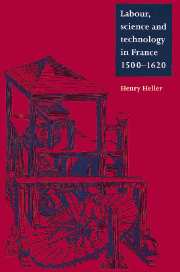Book contents
- Frontmatter
- Contents
- List of illustrations
- Preface
- List of abbreviations
- Introduction
- 1 The expansion of Parisian merchant capital
- 2 Labour in Paris in the sixteenth century
- 3 Civil war and economic experiments
- 4 Inventions and science in the reign of Charles IX
- 5 Expropriation, technology and wage labour
- 6 The Bourbon economic restoration
- 7 Braudel, Le Roy Ladurie and the inertia of history
- Bibliography
- Index
- CAMBRIDGE STUDIES IN EARLY MODERN HISTORY
1 - The expansion of Parisian merchant capital
Published online by Cambridge University Press: 01 October 2009
- Frontmatter
- Contents
- List of illustrations
- Preface
- List of abbreviations
- Introduction
- 1 The expansion of Parisian merchant capital
- 2 Labour in Paris in the sixteenth century
- 3 Civil war and economic experiments
- 4 Inventions and science in the reign of Charles IX
- 5 Expropriation, technology and wage labour
- 6 The Bourbon economic restoration
- 7 Braudel, Le Roy Ladurie and the inertia of history
- Bibliography
- Index
- CAMBRIDGE STUDIES IN EARLY MODERN HISTORY
Summary
Has there ever been an age more flourishing than our own in philosophy … and new inventions necessary to the life of men?
Jacques Peletier du Mans, L'arithemetique (1549)France in the sixteenth century was hardly a unified state, let alone a national market. Although the monarchy was more powerful than it had ever been, the balance of political power still lay with local elites. Likewise, the overwhelmingly largest part of trade and manufacture was locally consumed. Indeed, this ongoing political and economic localism helps to explain the striking vitality of small and medium-sized towns in France in the first part of the sixteenth century. In this period of the Renaissance, the monarchy was nevertheless more powerful than it had ever been. The expanding capacity of the state was facilitated by a surge of economic expansion which promoted a growing economic interdependence between different parts of the kingdom at the higher levels of trade and exchange. One of the two focal points of this economic expansion – second only to Lyons in importance – was Paris. Taking advantage of its strategic location between Mediterranean and Atlantic and its growing importance as the political capital of the kingdom, the growth of the capital was a reflection of the economic dynamism and political integration of sixteenth-century France as a whole.
Paris was by far the largest city in France in the sixteenth century.
- Type
- Chapter
- Information
- Labour, Science and Technology in France, 1500–1620 , pp. 6 - 27Publisher: Cambridge University PressPrint publication year: 1995



